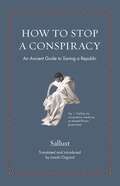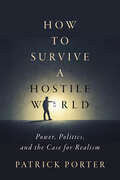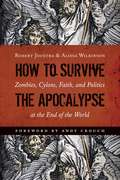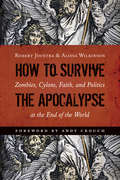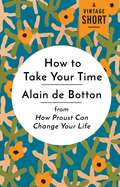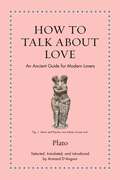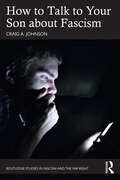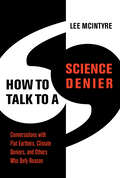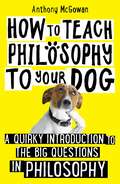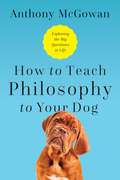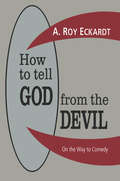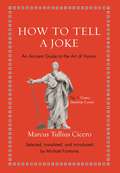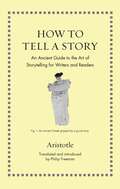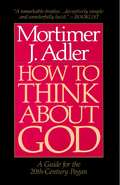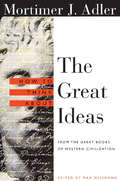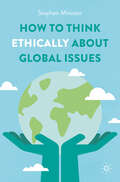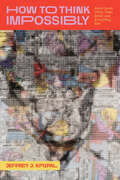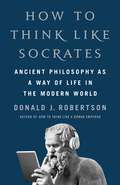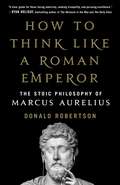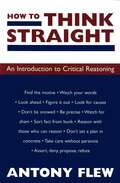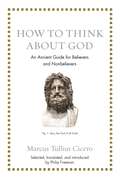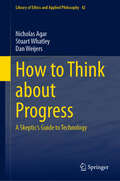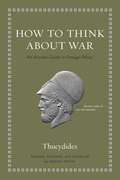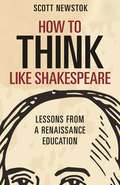- Table View
- List View
How to Stop a Conspiracy: An Ancient Guide to Saving a Republic (Ancient Wisdom for Modern Readers)
by SallustAn energetic new translation of an ancient Roman masterpiece about a failed coup led by a corrupt and charismatic politicianIn 63 BC, frustrated by his failure to be elected leader of the Roman Republic, the aristocrat Catiline tried to topple its elected government. Backed by corrupt elites and poor, alienated Romans, he fled Rome while his associates plotted to burn the city and murder its leading politicians. The attempted coup culminated with the unmasking of the conspirators in the Senate, a stormy debate that led to their execution, and the defeat of Catiline and his legions in battle. In How to Stop a Conspiracy, Josiah Osgood presents a brisk, modern new translation of the definitive account of these events, Sallust’s The War with Catiline—a brief, powerful book that has influenced how generations of readers, including America’s founders, have thought about coups and political conspiracies.In a taut, jaw-dropping narrative, Sallust pleasurably combines juicy details about Catiline and his louche associates with highly quotable moral judgments and a wrenching description of the widespread social misery they exploited. Along the way, we get unforgettable portraits of the bitter and haunted Catiline, who was sympathetic to the plight of Romans yet willing to destroy Rome; his archenemy Cicero, who thwarts the conspiracy; and Julius Caesar, who defends the conspirators and is accused of being one of them.Complete with an introduction that discusses how The War with Catiline has shaped and continues to shape our understanding of how republics live and die, and featuring the original Latin on facing pages, this volume makes Sallust’s gripping history more accessible than ever before.
How to Survive a Hostile World: Power, Politics, and the Case for Realism
by Patrick PorterThe oldest ideas are the best. This book is a defense of an ancient way of thinking about international politics: realism. Patrick Porter, a scholar of international relations, defends the realist approach to understanding the world by addressing head-on the most robust critiques of the tradition. Drawing from a wide literature, Porter restages three prominent criticisms of realism: that it is immoral, unrealistic, and provincial. In erudite, clear, and at times morbidly funny prose, Porter makes the case that realism is, in fact, everything its critics believe it is not: moral in its commitment to securing the polity and its interests in a world where there is no higher government; realistic and the best starting point for explaining how human groups tend to behave; and practical for use by everyone, everywhere, including beyond the Euro-Atlantic. From Thucydides to Kautilya to Machiavelli, realists claim that the world is an inherently dangerous place defined by the shadow of conflict, whether we like it or not. As the 21st century grapples with multiple interlocking crises concerning economic dislocation, climate change, and war, we need realism now more than ever. This book is for readers who are looking for sensible guidance on how to work within that reality and survive in an increasingly hostile world.
How to Survive the Apocalypse: Zombies, Cylons, Faith, and Politics at the End of the World
by Robert Joustra Alissa WilkinsonIncisive insights into contemporary pop culture and its apocalyptic bent. The world is going to hell. So begins this book, pointing to the prevalence of apocalypse — cataclysmic destruction and nightmarish end-of-the-world scenarios — in contemporary entertainment. In How to Survive the Apocalypse Robert Joustra and Alissa Wilkinson examine a number of popular stories — from the Cylons in Battlestar Galactica to the purging of innocence in Game of Thrones to the hordes of zombies in The Walking Dead — and argue that such apocalyptic stories reveal a lot about us here and now, about how we conceive of our life together, including some of our deepest tensions and anxieties. Besides analyzing the dsytopian shift in popular culture, Joustra and Wilkinson also suggest how Christians can live faithfully and with integrity in such a cultural context.
How to Survive the Apocalypse: Zombies, Cylons, Faith, and Politics at the End of the World
by Robert Joustra Alissa WilkinsonIncisive insights into contemporary pop culture and its apocalyptic bentThe world is going to hell. So begins this book, pointing to the prevalence of apocalypse — cataclysmic destruction and nightmarish end-of-the-world scenarios — in contemporary entertainment. In How to Survive the Apocalypse Robert Joustra and Alissa Wilkinson examine a number of popular stories — from the Cylons in Battlestar Galactica to the purging of innocence in Game of Thrones to the hordes of zombies in The Walking Dead — and argue that such apocalyptic stories reveal a lot about us here and now, about how we conceive of our life together, including some of our deepest tensions and anxieties. Besides analyzing the dsytopian shift in popular culture, Joustra and Wilkinson also suggest how Christians can live faithfully and with integrity in such a cultural context.
How to Survive the Apocalypse: Zombies, Cylons, Faith, and Politics at the End of the World
by Robert Joustra Alissa WilkinsonIncisive insights into contemporary pop culture and its apocalyptic bentThe world is going to hell. So begins this book, pointing to the prevalence of apocalypse — cataclysmic destruction and nightmarish end-of-the-world scenarios — in contemporary entertainment. In How to Survive the Apocalypse Robert Joustra and Alissa Wilkinson examine a number of popular stories — from the Cylons in Battlestar Galactica to the purging of innocence in Game of Thrones to the hordes of zombies in The Walking Dead — and argue that such apocalyptic stories reveal a lot about us here and now, about how we conceive of our life together, including some of our deepest tensions and anxieties. Besides analyzing the dsytopian shift in popular culture, Joustra and Wilkinson also suggest how Christians can live faithfully and with integrity in such a cultural context.
How to Take Your Time: from How Proust Can Change Your Life
by Alain De BottonCuriously practical—this no-nonsense blend of literary biography and self-help unravels how interesting life can be if only you could resist the impulse to rush through the mundane rituals of modern life. Every morning, Marcel Proust sipped his two cups of strong coffee with milk, ate a croissant from one boulangerie, dunking it in his coffee as he slowly read the day’s paper with great care—poring over each headline and section. Only Alain de Botton could have pulled so many useful insights from the oeuvre of one the world’s greatest literary masters. Fascinating and vital, How to Take Your Time will urge you to find the wisdom in defying “the self-satisfaction felt by ‘busy’ men—however idiotic their business—at ‘not having time’ to do what you are doing.” A Vintage Shorts Wellness selection. An ebook short.
How to Talk about Love: An Ancient Guide for Modern Lovers (Ancient Wisdom for Modern Readers)
by PlatoExplore the nature of love in this charming new translation of selections from Plato&’s great dramatic work, the SymposiumWhat is love? In poetry, songs, fiction, movies, psychology, and philosophy, love has been described, admired, lamented, and dissected in endless ways. Is love based on physical attraction? Does it bring out our better selves? How does it relate to sex? Is love divine? Plato&’s Symposium is one of the oldest, most influential, and most profound explorations of such questions—it is even the source of the idea of &“Platonic love.&” How to Talk about Love introduces and presents the key passages and central ideas of Plato&’s philosophical dialogue in a lively and highly readable new translation, which also features the original Greek on facing pages.The Symposium is set at a fictional drinking party during which prominent Athenians engage in a friendly competition by delivering improvised speeches in praise of Eros, the Greek god of love and sex. The aristocrat Phaedrus, the legal expert Pausanias, the physician Eryximachus, the comic playwright Aristophanes, and the tragic poet Agathon—each by turn celebrates different aspects of love before Socrates proposes not to praise love but to tell the truth about it. In the final speech, the politician and libertine Alcibiades argues that Socrates himself is the epitome of love.Deftly capturing the essence and spirit of Plato&’s masterpiece, How to Talk about Love makes the Symposium more accessible and enjoyable than ever before.
How to Talk to Your Son about Fascism (Routledge Studies in Fascism and the Far Right)
by Craig A. JohnsonHow to Talk to Your Son about Fascism is a practical guide for parents, carers, and others with young men in their lives on how to talk with those young men about fascism and the right-wing, which specifically and particularly preys on them for recruitment.Its central goal is to present research, history, and analysis about how and why the right-wing recruits young men to parents, educators, and anyone with a young person in their lives. The book covers the history of right-wing recruitment of young men, explaining why the right-wing focuses on recruiting men both on a theoretical basis and through the logic of movement-building, and then moves to practical analysis and suggestions for how to counter recruitment today. Recommendations come from excerpts and existing scholarship. Readers will come out of the book with a better understanding of what fascism is and how it works, how it preys on young men, how it recruits and appeals to them, and how to stop this from happening.This book will be of interest to antifascist researchers and activists, as well as parents, carers, and the general reader concerned about the rise of the extreme right.
How to Talk to a Science Denier: Conversations with Flat Earthers, Climate Deniers, and Others Who Defy Reason
by Lee McIntyreCan we change the minds of science deniers? Encounters with flat earthers, anti-vaxxers, coronavirus truthers, and others."Climate change is a hoax--and so is coronavirus." "Vaccines are bad for you." These days, many of our fellow citizens reject scientific expertise and prefer ideology to facts. They are not merely uninformed--they are misinformed. They cite cherry-picked evidence, rely on fake experts, and believe conspiracy theories. How can we convince such people otherwise? How can we get them to change their minds and accept the facts when they don't believe in facts? In this book, Lee McIntyre shows that anyone can fight back against science deniers, and argues that it's important to do so. Science denial can kill.Drawing on his own experience--including a visit to a Flat Earth convention--as well as academic research, McIntyre outlines the common themes of science denialism, present in misinformation campaigns ranging from tobacco companies' denial in the 1950s that smoking causes lung cancer to today's anti-vaxxers. He describes attempts to use his persuasive powers as a philosopher to convert Flat Earthers; surprising discussions with coal miners; and conversations with a scientist friend about genetically modified organisms in food. McIntyre offers tools and techniques for communicating the truth and values of science, emphasizing that the most important way to reach science deniers is to talk to them calmly and respectfully--to put ourselves out there, and meet them face to face.
How to Teach Philosophy to Your Dog: A Quirky Introduction to the Big Questions in Philosophy
by Anthony McGowanMonty was just like any other dog. A scruffy and irascible Maltese terrier, he enjoyed barking at pugs and sniffing at trees. But after yet another dramatic confrontation with the local Rottweiler, Anthony McGowan realises it&’s high time he and Monty had a chat about what makes him a good or a bad dog. And they don&’t stop at ethics. Taking his cue from Monty&’s canine antics, McGowan leads us on an enlightening jaunt through the world of philosophy. Will Kant convince Monty to stop stealing cheesecake? How long will they put up with Socrates poking holes in every argument? Do they have free will to pursue answers to these questions? Join the dutiful duo as they set out to uncover who – if anyone – has the right end of the ethical stick and can tell us how best to live one&’s life. But there is also a shadow over their conversations. Monty is not well… And so towards the end the biggest questions raise their heads: is there a God? Does life have a meaning? By the time of their last walk together, Monty – and the reader – will find that they have not just solved a few philosophical puzzles, but absorbed much of the history of Western philosophy.
How to Teach Philosophy to Your Dog: Exploring The Big Questions In Life
by Anthony McGowanBecause man’s best friend deserves to know the secrets of how to live a good life, too. Monty was just like any other dog. A scruffy and irascible Maltese terrier, he enjoyed barking at pugs and sniffing at trees. But after yet another dramatic confrontation with the local Rottweiler, Anthony McGowan realizes it’s high time he and Monty had a chat about what makes him a good or a bad dog. Taking his lead from Monty’s canine antics, McGowan takes us on a hilarious and enlightening jaunt through the major debates of philosophy. Will Kant convince Monty to stop stealing cheesecake? How long will they put up with Socrates poking holes in every argument? In this uniquely entertaining take on morality and ethics, the dutiful duo set out to uncover who—if anyone—has the right end of the ethical stick and can tell us how best to live one’s life.
How to Tell God from the Devil: On the Way to Comedy
by A. Roy EckardtHow to Tell God From the Devil is the first book to depict the relationship among comedy, the Devil, and God. Drawing from Jewish and Christian theories, Eckardt describes comedy as a means to distinguish the divine from the diabolic. He presents a thorough critique of efforts throughout history to justify God in the presence of radical evil and suffering. How to Tell God From the Devil is a sequel to Eckardt's fascinating earlier study Sitting in the Earth and Laughing.Eckardt offers a theological vision of the comic, and shows its practical use in differentiating God from the Devil. The viewpoint presupposed is a special application of the incongruity theory of humor, which sees humor as an attempt to deal with inexplicable occurrences. Eckardt shows how humor can make faulty explanations tolerable for examining evil and suffering, particularly the notion that God can somehow be "excused" for the terrible evils extant in the world. Eckardt critiques dualistic views that make the Devil and God independent sovereign beings, and monistic views that try to reduce evil to non-being. Eckardt holds God to be ultimately responsible for evil, in such ways that the only final resolution of evil-if there is such-is a form of divine comedy.Eckardt employs a variety of historical, psychological, sociological, philosophical, and theological sources. He discusses and assesses such diverse figures as Martin Luther, Reinhold Niebuhr, Zen Buddhists, Conrad Hyers, Nancy A. Walker, Jon D. Levenson, and Harvey Cox. How to Tell God From The Devil is an exceptional work, and will be significant and enjoyable for sociologists, theologians, philosophers, and specialists concerned with the study of humor.
How to Tell a Joke: An Ancient Guide to the Art of Humor (Ancient Wisdom for Modern Readers)
by Marcus Tullius CiceroTimeless advice about how to use humor to win over any audienceCan jokes win a hostile room, a hopeless argument, or even an election? You bet they can, according to Cicero, and he knew what he was talking about. One of Rome’s greatest politicians, speakers, and lawyers, Cicero was also reputedly one of antiquity’s funniest people. After he was elected commander-in-chief and head of state, his enemies even started calling him “the stand-up Consul.” How to Tell a Joke provides a lively new translation of Cicero’s essential writing on humor alongside that of the later Roman orator and educator Quintilian. The result is a timeless practical guide to how a well-timed joke can win over any audience.As powerful as jokes can be, they are also hugely risky. The line between a witty joke and an offensive one isn’t always clear. Cross it and you’ll look like a clown, or worse. Here, Cicero and Quintilian explore every aspect of telling jokes—while avoiding costly mistakes. Presenting the sections on humor in Cicero’s On the Ideal Orator and Quintilian’s The Education of the Orator, complete with an enlightening introduction and the original Latin on facing pages, How to Tell a Joke examines the risks and rewards of humor and analyzes basic types that readers can use to write their own jokes.Filled with insight, wit, and examples, including more than a few lawyer jokes, How to Tell a Joke will appeal to anyone interested in humor or the art of public speaking.
How to Tell a Story: An Ancient Guide to the Art of Storytelling for Writers and Readers (Ancient Wisdom for Modern Readers)
by AristotleAn inviting and highly readable new translation of Aristotle’s complete Poetics—the first and best introduction to the art of writing and understanding storiesAristotle’s Poetics is the most important book ever written for writers and readers of stories—whether novels, short fiction, plays, screenplays, or nonfiction. Aristotle was the first to identify the keys to plot, character, audience perception, tragic pleasure, and dozens of other critical points of good storytelling. Despite being written more than 2,000 years ago, the Poetics remains essential reading for anyone who wants to learn how to write a captivating story—or understand how such stories work and achieve their psychological effects. Yet for all its influence, the Poetics is too little read because it comes down to us in a form that is often difficult to follow, and even the best translations are geared more to specialists than to general readers who simply want to grasp Aristotle’s profound and practical insights. In How to Tell a Story, Philip Freeman presents the most readable translation of the Poetics yet produced, making this indispensable handbook more accessible, engaging, and useful than ever before.In addition to its inviting and reliable translation, a commentary on each section, and the original Greek on facing pages, this edition of the Poetics features unique bullet points, chapter headings, and section numbers to help guide readers through Aristotle’s unmatched introduction to the art of writing and reading stories.
How to Think About God: A Guide for the 20th-Century Pagan
by Mortimer J. AdlerDr. Adler, in his discussion, extends and modernizes the argument for the existence of God developed by Aristotle and Aquinas. Without relying on faith, mysticism, or science (none of which, according to Dr. Adler, can prove or disprove the existence of God), he uses a rationalist argument to lead the reader to a point where he or she can see that the existence of God is not necessarily dependent upon a suspension of disbelief. Dr. Adler provides a nondogmatic exposition of the principles behind the belief that God, or some other supernatural cause, has to exist in some form. Through concise and lucid arguments, Dr. Adler shapes a highly emotional and often erratic conception of God into a credible and understandable concept for the lay person.
How to Think About the Great Ideas
by Max Weismann Mortimer AdlerTime magazine called Mortimer J. Adler a "philosopher for everyman." In this guide to considering the big questions, Adler addresses the topics all men and women ponder in the course of life, such as "What is love?", "How do we decide the right thing to do?", and, "What does it mean to be good?" Drawing on his extensive knowledge of Western literature, history, and philosophy, the author considers what is meant by democracy, law, emotion, language, truth, and other abstract concepts in light of more than two millennia of Western civilization and discourse. Adler's essays offer a remarkable and contemplative distillation of the Great Ideas of Western Thought.
How to Think Ethically about Global Issues
by Stephen MinisterThis textbook is an introduction to thinking ethically about global issues. Unlike existing books in this area, this book is truly interdisciplinary and includes a range of voices from both the Global South and the Global North. Rather than simply applying Western theories to case studies, Prof. Stephen Minister shows readers how to consider context and complexity, while respecting the agency of people elsewhere. It weaves together the work of thinkers and writers from the Global South with philosophical work on global ethics, relevant scholarship from other academic fields, and stories from fieldwork studying global issues on four continents. The textbook explores a variety of topics, including: cultural difference, gender, population, poverty, natural disasters, and development. It then encourages students to build on these ideas and think more deeply about topics such as foreign aid, inequality, immigration, international trade, climate change, human rights, and war and terrorism. Because the book’s style is accessible and engaging, it will be an excellent text for ethics and global studies courses, as well as being of interest to general readers who want to think better about global issues.
How to Think Impossibly: About Souls, UFOs, Time, Belief, and Everything Else
by Jeffrey J. KripalA mind-bending invitation to experience the impossible as fundamentally human. From precognitive dreams and telepathic visions to near-death experiences, UFO encounters, and beyond, so-called impossible phenomena are not supposed to happen. But they do happen—all the time. Jeffrey J. Kripal asserts that the impossible is a function not of reality but of our everchanging assumptions about what is real. How to Think Impossibly invites us to think about these fantastic (yet commonplace) experiences as an essential part of being human, expressive of a deeply shared reality that is neither mental nor material but gives rise to both. Thinking with specific individuals and their extraordinary experiences in vulnerable, open, and often humorous ways, Kripal interweaves humanistic and scientific inquiry to foster an awareness that the fantastic is real, the supernatural is super natural, and the impossible is possible.
How to Think Like Socrates: Ancient Philosophy as a Way of Life in the Modern World
by Donald J. RobertsonHow can we apply the teachings of the greatest ancient philosopher to modern life?Socrates is the quintessential Athenian philosopher, the source of the entire Western philosophical tradition, and Godfather to the Stoics. He spent his life teaching practical philosophy to ordinary people in the streets of Athens, yet few people today are familiar with the wisdom he has to offer us.How to Think Like Socrates is an accessible and informative guide to the life of one of the greatest thinkers in history, and the first book to focus on applying his ideas to our daily lives. Author Donald J. Robertson transports readers back to ancient Athens, expertly weaving together a page-turning account of a philosopher who eschewed material pleasures and stood by his beliefs, even in the face of controversy, with a steadfastness that ultimately resulted in his execution.How to Think Like Socrates highlights the continuing value of the Socratic Method to modern life. As a practicing cognitive-behavioral psychotherapist, Robertson also uses his expertise to reveal many parallels between the evidence-based concepts and techniques of modern psychology and the philosophy of Socrates, and shows how his philosophical insights can guide and benefit all of us to this day.
How to Think Like a Roman Emperor: The Stoic Philosophy of Marcus Aurelius
by Donald J. Robertson"This book is a wonderful introduction to one of history's greatest figures: Marcus Aurelius. His life and this book are a clear guide for those facing adversity, seeking tranquility and pursuing excellence." —Ryan Holiday, bestselling author of The Obstacle is the Way and The Daily StoicThe life-changing principles of Stoicism taught through the story of its most famous proponent.Roman emperor Marcus Aurelius was the last famous Stoic philosopher of the ancient world. The Meditations, his personal journal, survives to this day as one of the most loved self-help and spiritual classics of all time. In How to Think Like a Roman Emperor, cognitive psychotherapist Donald Robertson weaves the life and philosophy of Marcus Aurelius together seamlessly to provide a compelling modern-day guide to the Stoic wisdom followed by countless individuals throughout the centuries as a path to achieving greater fulfillment and emotional resilience. How to Think Like a Roman Emperor takes readers on a transformative journey along with Marcus, following his progress from a young noble at the court of Hadrian—taken under the wing of some of the finest philosophers of his day—through to his reign as emperor of Rome at the height of its power. Robertson shows how Marcus used philosophical doctrines and therapeutic practices to build emotional resilience and endure tremendous adversity, and guides readers through applying the same methods to their own lives.Combining remarkable stories from Marcus’s life with insights from modern psychology and the enduring wisdom of his philosophy, How to Think Like a Roman Emperor puts a human face on Stoicism and offers a timeless and essential guide to handling the ethical and psychological challenges we face today.
How to Think Straight: An Introduction to Critical Reasoning
by Antony FlewPractical reasoning and clear thinking are essential for everyone if we are to make sense of the information we receive each day. Being able to quickly know the difference between valid and invalid arguments, the contradictory versus the contrary, vagueness and ambiguity, contradiction and self-contradiction, the truthful and the fallacious, separates clear thinkers from the crowd. How to Think Straight lays the foundation for critical reasoning by showing many ways in which our thinking goes awry. Celebrated philosopher Antony Flew entertainingly instructs on the many and varied faults that occur in argument, the power of reason, how to challenge assertions and find evidence, and how not to be persuaded by half-truths. Flew also examines poor reasoning, and why we should be concerned with finding the truth. Lucid, terse, and sensible, with study questions and exercises to help along the way, this enlightening second edition will help you develop the skills necessary to argue and reason effectively by following a few simple, easy-to-remember directions.
How to Think about God: An Ancient Guide for Believers and Nonbelievers (Ancient Wisdom for Modern Readers)
by Marcus CiceroA vivid and accessible new translation of Cicero’s influential writings on the Stoic idea of the divineMost ancient Romans were deeply religious and their world was overflowing with gods—from Jupiter, Minerva, and Mars to countless local divinities, household gods, and ancestral spirits. One of the most influential Roman perspectives on religion came from a nonreligious belief system that is finding new adherents even today: Stoicism. How did the Stoics think about religion? In How to Think about God, Philip Freeman presents vivid new translations of Cicero's On the Nature of the Gods and The Dream of Scipio. In these brief works, Cicero offers a Stoic view of belief, divinity, and human immortality, giving eloquent expression to the religious ideas of one of the most popular schools of Roman and Greek philosophy.On the Nature of the Gods and The Dream of Scipio are Cicero's best-known and most important writings on religion, and they have profoundly shaped Christian and non-Christian thought for more than two thousand years, influencing such luminaries as Augustine, Thomas Aquinas, Dante, and Thomas Jefferson. These works reveal many of the religious aspects of Stoicism, including an understanding of the universe as a materialistic yet continuous and living whole in which both the gods and a supreme God are essential elements.Featuring an introduction, suggestions for further reading, and the original Latin on facing pages, How to Think about God is a compelling guide to the Stoic view of the divine.
How to Think about Progress: A Skeptic's Guide to Technology (Library of Ethics and Applied Philosophy #42)
by Nicholas Agar Stuart Whatley Dan WeijersHow to Think about Progress is an interdisciplinary work exploring whether optimistic claims about technology’s potential stand up to humanity’s most difficult challenges. Will technology solve the problems of climate change, pandemics, cancer, loneliness, unhappiness, and even death? The authors show that techno-hype is all too often accepted because of the horizon bias, i.e. the modern propensity to believe that any problem that can be solved with technology will be solved in the very near future. The authors situate their analysis in a broad context, drawing on history, literature, and popular culture to emphasize their case against techno-hype. They also draw on a wide range of research, including that of biologists, philosophers of science and of language, psychologists, theorists of technological change, specialists on digital technologies, historians of ideas, and economists. As a corrective to much mainstream “futurism,” the book offers principles for seeing through much of the techno-hype that circulates online and in best-selling books. The authors share insights (without the jargon) from a variety of academic disciplines, making this book an engaging read for all audiences. Readers will find a balanced framework for thinking and writing about technological progress in the face of truly vexing challenges like cancer, climate change, and colonizing mars.
How to Think about War: An Ancient Guide to Foreign Policy (Ancient Wisdom For Modern Readers Ser.)
by Thucydides Johanna HaninkAn accessible modern translation of essential speeches from Thucydides’s History that takes readers to the heart of his profound insights on diplomacy, foreign policy, and warWhy do nations go to war? What are citizens willing to die for? What justifies foreign invasion? And does might always make right? For nearly 2,500 years, students, politicians, political thinkers, and military leaders have read the eloquent and shrewd speeches in Thucydides’s History of the Peloponnesian War for profound insights into military conflict, diplomacy, and the behavior of people and countries in times of crisis. How to Think about War presents the most influential and compelling of these speeches in an elegant new translation by classicist Johanna Hanink, accompanied by an enlightening introduction, informative headnotes, and the original Greek on facing pages. The result is an ideally accessible introduction to Thucydides’s long and challenging History.Thucydides intended his account of the clash between classical Greece’s mightiest powers—Athens and Sparta—to be a “possession for all time.” Today, it remains a foundational work for the study not only of ancient history but also contemporary politics and international relations. How to Think about War features speeches that have earned the History its celebrated status—all of those delivered before the Athenian Assembly, as well as Pericles’s funeral oration and the notoriously ruthless “Melian Dialogue.” Organized by key debates, these complex speeches reveal the recklessness, cruelty, and realpolitik of Athenian warfighting and imperialism.The first English-language collection of speeches from Thucydides in nearly half a century, How to Think about War takes readers straight to the heart of this timeless thinker.
How to Think like Shakespeare: Lessons from a Renaissance Education (Skills For Scholars Ser.)
by Scott NewstokA lively and engaging guide to vital habits of mind that can help you think more deeply, write more effectively, and learn more joyfullyHow to Think like Shakespeare offers an enlightening and entertaining guide to the craft of thought—one that demonstrates what we've lost in education today, and how we might begin to recover it. In fourteen brief, lively chapters that draw from Shakespeare's world and works, and from other writers past and present, Scott Newstok distills vital habits of mind that can help you think more deeply, write more effectively, and learn more joyfully, in school or beyond.Challenging a host of today's questionable notions about education, Newstok shows how mental play emerges through work, creativity through imitation, autonomy through tradition, innovation through constraint, and freedom through discipline. It was these practices, and a conversation with the past—not a fruitless obsession with assessment—that nurtured a mind like Shakespeare's. And while few of us can hope to approach the genius of the Bard, we can all learn from the exercises that shaped him.Written in a friendly, conversational tone and brimming with insights, How to Think like Shakespeare enacts the thrill of thinking on every page, reviving timeless—and timely—ways to stretch your mind and hone your words.
